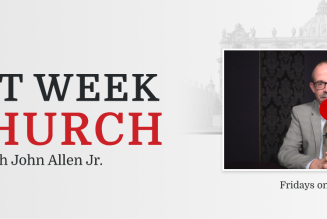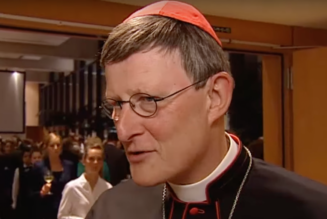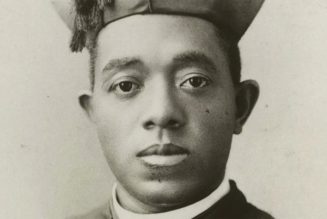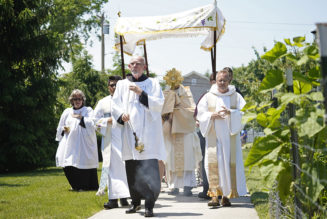By Dr. Jeff Mirus ( bio – articles – email ) | Apr 22, 2022
I admit it; I’m sharing the luster of Phil Lawler’s excellent commentary entitled Discord among Catholic bishops: a healthy sign. Just a week or so ago, it infuriated me to read of some of the speeches at the mysterious meeting of Catholic “leaders” in Chicago. Perhaps the most notable story was this: Speaker at meeting of cardinals, theologians rips ‘Catho-capitalists,’ ‘culture warriors,’ National Catholic Bioethics Center—an address from a corresponding member of the Pontifical Academy for Life! With a pope who can often at least be interpreted as undermining sound Catholic thought and action in the world, it is not surprising to find conferences held and attended by prominent ecclesiastics and their appointees—conferences to “figure out” the best way to counter regressive forces within the Church who are deemed to be out of step with the program of the current pontificate.
But even if it is not surprising, it is highly significant. The bishops and cardinals who seriously desire to push some of Pope Francis’ most dubious talking points even further than the Pope himself are a minority in the Church as a whole, and they know it. They are self-evidently a minority in the United States, which is sometimes styled as an ecclesiastical bastion of resistance to Pope Francis, though it is very far from any such thing. In the case of the recent Chicago gathering, this minority status is more than evident from the all but exclusive coverage given to the event by the notorious National Catholic Reporter. What we are seeing here is an effort to resurrect the wayward Catholic agenda of the 1970s, which was largely marginalized during the pontificates of Pope St. John Paul II and Pope Benedict XVI.
What is different this time around, however, is exactly what Phil Lawler called attention to—namely that a growing number of other Catholic bishops are willing to reject publicly this sort of manipulation of Catholic faith, morals and practice, and (even better) to make a point of keeping their own dioceses firmly on a Catholic course. There are obviously many countries with weak and even heterodox bishops, but so far they have been able to hijack the synodal process only in a small number of places (most notably in Germany). The failure to hijack the process in the US is a significant concern to some; hence, I would say, the Chicago convention.
In any case, what will mostly make its way toward Synodal approval will be what the pope at that time wants to hear. And, as always, it will be interpreted in a faithful manner by faithful bishops, but it will also lend itself to support for heterodox positions by those bishops who simply cannot wean themselves away from the dominant secular culture in which (so very sadly) they live and move and have their being. As we all know, a faithful and courageous bishop’s call to doctrinal and moral mission is an unfaithful and cowardly bishop’s call to doctrinal and moral change. Thus has it always been in this world.
The call to mission
For this reason, while a synodal church (call it a church firing on all cylinders, with everybody engaged in the Catholic mission) is eminently desirable, everybody knows that, in the modern Church, calls for increased participation are most often interpreted as calls for the empowerment of those who have very different concepts of the true and the good, concepts which are subversive of the Church, which is inescapably grounded in what has been Divinely revealed. As I mentioned, it is good to understand these conflicting ideas and ideologies, for it is just this that ought to awaken good Catholic everywhere, and especially good bishops, to a profound and urgent sense of mission.
But very often, as all adults living today have frequently witnessed, this understanding is used as an excuse to accommodate what is false, to implement plans and programs which maximize the ecclesiastical space for infidelity. That is the near universal experience of Catholics in the West, at least, as the dominant culture has increasingly spun away from and even forcefully rejected truth and goodness, as officially taught by the Catholic Church.
Well may Catholics wonder, then, what a good bishop ought to do in the face of a constant pressure for secularization—a constant pressure to substitute modern cultural norms for an authentically Christian way of life, a constant pressure to “reinterpret” Catholic moral teachings so that favored spiritual pathologies may be welcomed into the Church without being cured by sound guidance and the reception of grace.
What follows is hardly in the character of the seven gifts of the Holy Spirit or the seven deadly sins; I have come up with it only today. Nonetheless, here is a list of seven “wills and won’ts”:
- A good bishop will first of all maintain absolute private and public fidelity to Christ as represented doctrinally and morally by the Magisterium of the Church and, with equal importance, strive to ensure that fidelity through constant prayer.
- A good bishop will interpret increasing departure from Catholic teaching and sacramental life in his diocese, both in the general public and among the nominally Catholic, as a call to mission, not a call to accommodation.
- A good bishop will ensure sound faith, morals and liturgy in the Church’s ministry throughout his diocese, by an effective use of his disciplinary authority.
- A good bishop will issue brief public teaching documents and instructions on particularly dangerous issues within his diocese and within the larger culture, as specific guides to priests, deacons and laity.
- A good bishop will avoid public correction of other bishops. His actions and teaching for his own diocese will be sufficient to distance himself from wayward brethren. If this makes his disagreement with another obvious, so much the better. But fraternal correction should be done privately by one or a small group (Mt. 18:15-17) before being elevated to a public cause within the Church as a whole.
- A good bishop will join with other good bishops in issuing joint statements for their respective territories. This may even be necessary to counter other such statements that have been publicized by the wayward to the confusion of the faithful. Such statements can cite the universal Magisterium of the Church to excellent effect, but they must be directed to their own jurisdictions; they cannot of themselves be directed formally to the whole Church.
- A good bishop will, through prayer and reflection, daily increase his desire to be identified with Christ and the Magisterium of the Church, both of which he represents as a vicar of Christ in his own diocese. In precisely this sense, he will shun ambiguity, preferring both truth and spiritual healing out of love for those committed to his care.
Good bishops do not go out of their way to attack their brethren. They let their own example speak far more loudly. It is precisely in this that they must have the courage to take their own path, which will be the path of Christ, which amounts always to the courage to disagree with others. In our modern culture, when too many Catholics at all levels alter their stripes to blend into their surroundings, Phil Lawler is spot-on: Discord among bishops is “a healthy sign”. For it is today as it was when St. Paul wrote to his new bishop Timothy:
O Timothy, guard what has been entrusted to you. Avoid the godless chatter and contradictions of what is falsely called knowledge, for by professing it some have missed the mark as regards the faith. [1 Tim 6:20-21]
Indeed, as Paul had already stated in the same letter: “God our savior…desires all men to be saved and to come to the knowledge of the truth” (2:3-4). The two are very, very closely related. And this must also be the most ardent desire of each and every bishop: Not inclusion as man includes, but salvation as God saves.
Sound Off! CatholicCulture.org supporters weigh in.
All comments are moderated. To lighten our editing burden, only current donors are allowed to Sound Off. If you are a current donor, log in to see the comment form; otherwise please support our work, and Sound Off!

There are no comments yet for this item.
Join Our Telegram Group : Salvation & Prosperity









